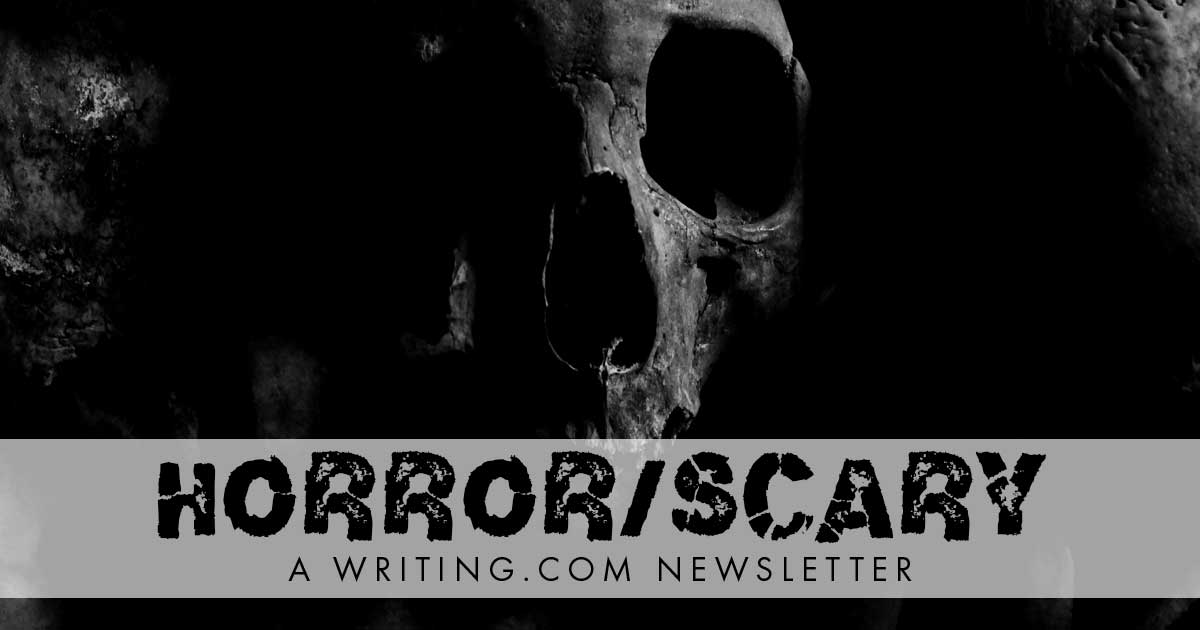This week: What lies beneath Edited by: Arakun the Scary Raccoon  
More Newsletters By This Editor 
![Table of Contents [#401437]
Table of Contents](https://www.Writing.Com/main/trans.gif) ![Table of Contents [#401437]
Table of Contents Table of Contents](/main/images/action/display/ver/1709303267/item_id/401437.png)
1. About this Newsletter
2. A Word from our Sponsor
3. Letter from the Editor
4. Editor's Picks
5. A Word from Writing.Com
6. Ask & Answer
7. Removal instructions
![About This Newsletter [#401439]
About This Newsletter](https://www.Writing.Com/main/trans.gif) ![About This Newsletter [#401439]
About This Newsletter About This Newsletter](https://www.writing.com/main/images/action/display/ver/1709303676/item_id/401439.png)
Quote for the week: "The cave you fear to enter holds the treasure you seek."
~ Joseph Campbell |
![Letter from the editor [#401442]
Letter from the editor](https://www.Writing.Com/main/trans.gif) ![Letter from the editor [#401442]
Letter from the editor Letter from the editor](https://www.writing.com/main/images/action/display/ver/1709303784/item_id/401442.png)
Underground settings are made for horror. Underground places feed into our fears of darkness, enclosed spaces, and the unknown. Here are a few examples:
Caves
Caverns can be both beautiful and dangerous. The sections of caves that are open to tourists are usually those that are relatively close to the surface with easy access. Some of the world's largest caves may have thousands of miles of yet undiscovered passages.
If you have never been deep in a cave with all external light sources extinguished, you have never experienced total darkness. Under low light conditions, the irises of our eyes expand to take in all the light they can, allowing us to get used to the gloom. However, in a cave, there is no additional light to take in. When it is dark, you cannot even see vague shapes of the things around you. Since eyesight is basically useless in a cave, many animal species that spend their entire lives in subterranean passages have lost their sight. Some have vestigial eyes or no eyes at all.
Even if you have a good headlamp with several batteries, it is easy to get lost in a cave if you don't know where you are going. Even experienced cave explorers never explore alone and are careful never to explore only short sections of unexplored passages at a time.
Abandoned mines, sewers, subway passages, and other manmade structures
Old mines have many of the same properties as caves, but also contain aging construction that might fail. Old mines were often dangerous even when actively mined. Many ghost legends are associated with old mines, especially if there were accidents that took lives. Other mythological creatures associated with mines include gnomes, dwarves, and kobolds.
Sewers are disgusting for obvious reasons, even when no longer used. We've all heard the stories of alligators, pizza loving turtles  , and other creatures reported to live in sewers. , and other creatures reported to live in sewers.
Graves
Graves and graveyards are frightening because of their association with death, but also because of fear of being buried alive. Imagine falling asleep and waking up in a coffin buried six feet under ground. This fear probably arose at a time when medical science was more primitive than it is now, and more people were mistakenly pronounced dead. The story, "The Golden Egg" by Tim Krabbe plays on the fear of being buried alive. Two movies, one Dutch and one American, were based on this story. The Dutch movie made in 1988 was entitled "Sparloos" (Without a Trace). The American movie made in 1991 was entitled, "The Vanishing."
Hell
In many mythologies, the abode of the dead is underground. In some stories, all the dead spend eternity in an underground world. In others, the underground afterlife is reserved for torture of evil souls. Legends of hellfire may have arisen when people observed volcanic eruptions.
Something to try: Write a horror story that is set underground. |
![Editor's Picks [#401445]
Editor's Picks](https://www.Writing.Com/main/trans.gif) ![Editor's Picks [#401445]
Editor's Picks Editor's Picks](https://www.writing.com/main/images/action/display/ver/1709303830/item_id/401445.png)
| |  | Invalid Item 
This item number is not valid.
#2165184 by Not Available. |
|
![Word From Writing.Com [#401447]
Word from Writing.Com](https://www.Writing.Com/main/trans.gif) ![Word From Writing.Com [#401447]
Word from Writing.Com Word from Writing.Com](https://www.writing.com/main/images/action/display/ver/1709303874/item_id/401447.png)
Have an opinion on what you've read here today? Then send the Editor feedback! Find an item that you think would be perfect for showcasing here? Submit it for consideration in the newsletter!
https://www.Writing.Com/go/nl_form
![Ask & Answer [#401448]
Ask & Answer](https://www.Writing.Com/main/trans.gif) ![Ask & Answer [#401448]
Ask & Answer Ask & Answer](https://www.writing.com/main/images/action/display/ver/1709303902/item_id/401448.png)
| Question for next time: What topics would you like to see in future horror newsletters? |
![Unsubscribe [#401452]
Removal Instructions](https://www.Writing.Com/main/trans.gif) ![Unsubscribe [#401452]
Removal Instructions Removal Instructions](https://www.writing.com/main/images/action/display/ver/1709303960/item_id/401452.png)
To stop receiving this newsletter, click here for your newsletter subscription list. Simply uncheck the box next to any newsletter(s) you wish to cancel and then click to "Submit Changes". You can edit your subscriptions at any time.
|
